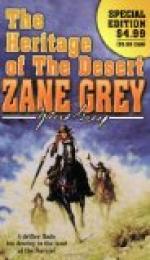Any other reply from her would not have been consistent with the impression she was making on him. As yet he had hardly regarded her as a young girl; she had been part of this beautiful desert-land. But he began to see in her a responsive being, influenced by his presence. If the situation was wonderful to him what must it be for her? Like a shy, illusive creature, unused to men, she was troubled by questions, fearful of the sound of her own voice. Yet in repose, as she watched the lights and shadows, she was serene, unconscious; her dark, quiet glance was dreamy and sad, and in it was the sombre, brooding strength of the desert.
Twilight and falling dew sent them back to the camp. Piute and Peon were skinning coyotes by the blaze of the fire. The night wind had not yet risen; the sheep were quiet; there was no sound save the crackle of burning cedar sticks. Jack began to talk; he had to talk, so, addressing Piute and the dumb peon, he struck at random into speech, and words flowed with a rush. Piute approved, for he said “damn” whenever his intelligence grasped a meaning, and the peon twisted his lips and fixed his diamond eyes upon Hare in rapt gaze. The sound of a voice was welcome to the sentinels of that lonely sheep-range. Jack talked of cities, of ships, of people, of simple things in the life he had left, and he discovered that Mescal listened. Not only did she listen; she became absorbed; it was romance to her, fulfilment of her vague dreams. Nor did she seek her tent till he ceased; then with a startled “good-night” she was gone.
From under the snugness of his warm blankets Jack watched out the last wakeful moments of that day of days. A star peeped through the fringe of cedar foliage. The wind sighed, and rose steadily, to sweep over him with breath of ice, with the fragrance of juniper and black sage and a tang of cedar.
But that day was only the beginning of eventful days, of increasing charm, of forgetfulness of self, of time that passed unnoted. Every succeeding day was like its predecessor, only richer. Every day the hoar-frost silvered the dawn; the sheep browsed; the coyotes skulked in the thickets; the rifle spoke truer and truer. Every sunset Mescal’s changing eyes mirrored the desert. Every twilight Jack sat beside her in the silence; every night, in the camp-fire flare, he talked to Piute and the peon.
The Indians were appreciative listeners, whether they understood Jack or not, but his talk with them was only a presence. He wished to reveal the outside world to Mescal, and he saw with pleasure that every day she grew more interested.




